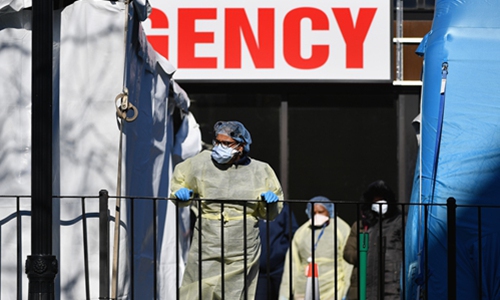Why American voters are easy to fool despite epic pandemic failure
By Xu Liang Source:Global Times Published: 2020/4/26 23:13:40

Medical workers look out of the Elmhurst Hospital Center in Queens, New York on March 26. Photo: AFP
The total number of confirmed COVID-19 cases of the US surged past 936,000 on Sunday morning, the highest of any country in the world. The figure is predicted to exceed 1 million by the end of April. The severity of the outbreak in the US is inseparable from President Donald Trump's initial missteps, which have had an enormous negative impact on the country.
Trump's mishandling over the COVID-19 epidemic has been evident, but the recent (and temporary) rise in his approval rating reveals the complexity of US politics. RealClearPolitics reported on April 16 that Trump's job approval rating had increased by four to five percent, which can be attributed to the following.
First, it reflects the polarization of US politics and the average voter's approval of Trump. The polarization of US society becomes increasingly fierce. In the face of accusations from Democrats, Trump's supporters refuse to attribute the failure to curb the spread of the outbreak to Trump. They judge Trump according to his consistent performance, not just his handling of the pandemic. They are inclined to be convinced by Trump's defense of the problem, and forgive him.
Those who distrust the President, no matter how many effort Trump makes, never stop criticizing him. The US out-of-control outbreak has intensified their criticism.
In this context, it is the average voter who plays a pivotal role in elections. The average voter tends to concentrate on long-term achievements and the president's overall performance during his tenure, rather than a single issue such as pandemic failures.
Trump has implemented certain measures to prevent and control the pandemic, including restricting entry to the US and handing out emergency payment to ordinary people in the US. These policies have helped in stabilizing US society and have prevented the country from falling into chaos.
Second, Trump's approval rating boost reflects the political bottom line of US society. In the US, a country founded on the Mayflower Compact, the Declaration of Independence, Americans recognize values and its so-called freedom and democracy. The US' stubborn insistence on the concept of freedom prevents this country from effectively curbing the spread of the COVID-19.
Third, Trump's boost in popularity reflects how the US public remains skeptical of alternative political systems and governance models. Confidence has turned into arrogance after the US' model triumphed over fascism and the collapse of the Soviet Union.
Such arrogance is underlined by the US' stubborn distrust of China's data on COVID-19 and its determined refusal to follow China's successful experience, including the simple requirement to wear masks.
It also reflects the scarcity of institutional alternatives worldwide since the end of the Cold War. American's tend to believe that Democrats won't be any better than Republicans and there is no better system than dysfunctional Keynesianism.
Both parties' past governing performance has also disappointed voters. As early as the Vietnam war, US public frustration and distrust in the government has reached an ever-higher level.
The US president would not follow the strict control policies of China, unless there was a social and institutional revolution in the US, which is impossible to imagine.
Fourth, because of low trust in the US government, Americans who value individualism tend to believe more in their own immunity. This is reflected in the many people who continued to gather, defying social distancing rule, even during the height of the epidemic in early April. Americans are used to an increased number of deaths during the seasonal flu.
Successful brainwashing of patriotism in the US also asks people to show solidarity and support for the president in times of national emergency. This is rooted in their patriotic education from an early age.
With the outbreak at a high level, Trump tries to enhance his reelection campaign by suspending immigration, announcing the resumption of work and scapegoating China. All these measures attempt to win back the support of his traditional voters, and to appeal to middle and lower class voters.
As the vast majority of the US public has little savings and now no income during the lockdown, the US is faced with its biggest political and economic crisis.
The author is an associate professor at the School of International Relations, Beijing International Studies University, and a visiting scholar at the University of Iowa. opinion@globaltime.com.cn
Posted in: VIEWPOINT